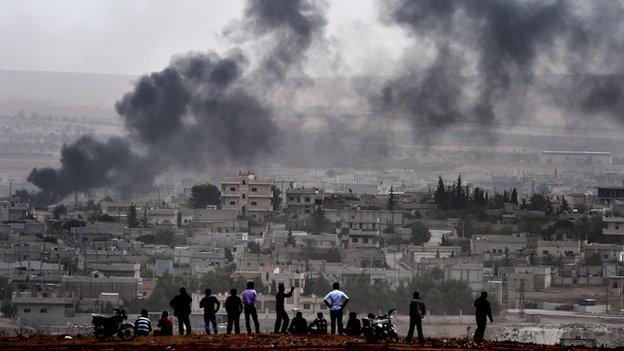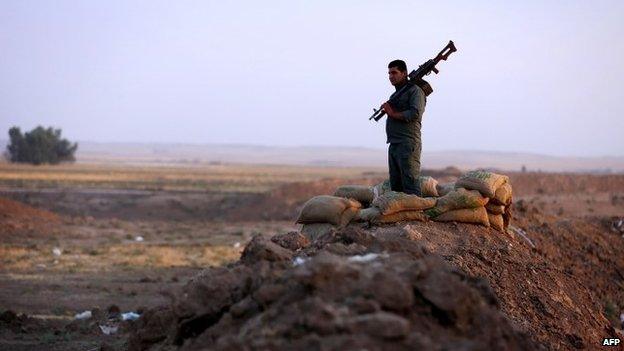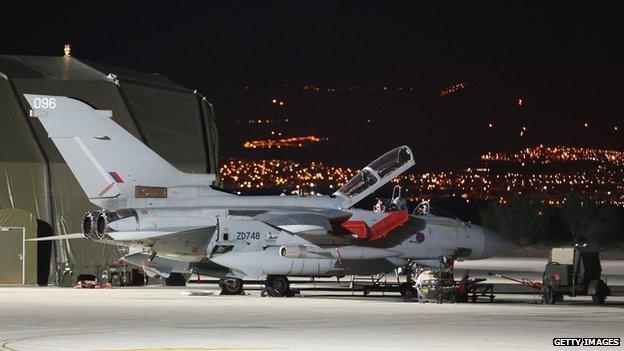UK troops training Kurdish forces in Iraq, says MoD
- Published
British soldiers training the Peshmerga will be on the ground for a week
A "specialist team" of 12 UK soldiers is training Kurdish forces fighting Islamic State militants in Iraq, the Ministry of Defence has said.
It said troops from the Yorkshire Regiment were training Iraqi Kurds to use UK-supplied heavy machine guns.
The soldiers are expected to spend a week in Irbil, in Kurdish-controlled northern Iraq.
Royal Air Force Tornado jets based in Cyprus have been flying combat missions over Iraq since September.
The UK training mission comes amid heavy fighting between Syrian Kurds and IS forces in the town of Kobane, in Syria.
Last month, the Ministry of Defence announced, external it was supplying Kurdish forces, known as the Peshmerga, with 40 heavy machine guns, as well as thousands of rounds of ammunition.
The RAF has also transported military equipment and ammunition to northern Iraq on behalf of other countries, while providing equipment such as body armour, helmets and ration packs.
'Non-combat army trainers'
Confirming the deployment, an MoD spokesman said the government had previously made clear its intention to provide training to the Peshmerga as part of a "continued effort" to assist the fight against IS.

Civilians watched fighting in Kobane from across the nearby Turkish border
"The defence secretary has approved the deployment of a small specialist team of non-combat Army trainers, which is now in the Irbil area providing instruction on operating, employing and maintaining the heavy machine guns that were gifted by the UK last month," the spokesman added.
BBC defence correspondent Jonathan Beale said the UK team, from 2nd Battalion the Yorkshire Regiment, would not be in a combat role.
"But there is a promise that Britain will be doing more to help train Iraq's security forces in the coming weeks and months. But so far, Britain's contribution to this US led effort has been modest."
The BBC's Jim Muir, in Irbil, said this deployment "was not the spearhead of a vast contingent marching in".
However, there would probably be more "topical and limited-in-duration" missions, he added.
Evening Standard defence correspondent Robert Fox told BBC Radio 5 Live the guns had been sent in September and it was "astonishing" that it had taken the government six weeks to send soldiers to train the Kurdish forces in how to use them.
Sir Bob Russell, a member of the Commons defence committee, said Parliament should have been informed about the deployment.

The Kurdish Peshmerga say they need more sophisticated weapons
"This is certainly an escalation, albeit a small one in terms of numbers, but an escalation in terms of what Britain is doing there," he said.
Steve McLaughlin, a former soldier who served in Iraq and author of Squaddie: A Soldier's Story, warned of mission creep.
He said: "The most classic example of mission creep is the Vietnam War. Back in the 1960s, a handful of American Green Berets went over to train the rebels and look what happened.
"And that's what could happen to us."
The last UK combat troops left Iraq in April 2009, with a small number staying on to train Iraqi forces until 2011.
The UK had joined the US-led military campaign against Iraq in 2003 over the perceived existence of weapons of mass destruction.
The invasion led to the overthrow of the country's dictator Saddam Hussein, marking the start of years of violent conflict with different groups competing for power.
Air strikes
IS - also known as Isis or Isil - controls large swathes of Syria and Iraq after rapid advances through the region this year.
The extremist group, which claims to have fighters from across the world, has forced many minority communities from their home.
Since August, IS has filmed and posted online videos purporting to show the beheading of four Western hostages.
They were US journalists James Foley and Steven Sotloff and British aid workers David Haines and Alan Henning.

RAF jets have been conducting daily flights over Iraq, amid fierce fighting near the Syrian-Turkish border
The UK is among more than 40 nations that have joined forces to challenge the militant group.
Countries including the US have also taken part in air strikes against militant positions in Syria, but the UK military effort has so far been confined to Iraq.
In Syria, an intense battle is taking place for Kobane, a strategic town on the country's border with Turkey.
At least 553 people are reported to have died in a month of fighting, the Syrian Observatory for Human Rights said. The UK-based Syrian opposition body counted 298 IS fighters among the dead.
US aircraft have bombed IS positions but Kurdish leaders said they remain outgunned on the ground.
Kobane official Idris Nassan told Reuters news agency that "the supply of fighters is very good".
"But fighters coming without arms, without weaponry, is not going to make a critical difference," he added.
There has been a civil war in Syria since 2011 when an anti-government uprising turned violent. IS supported Syria's opposition by sending cash and fighters.